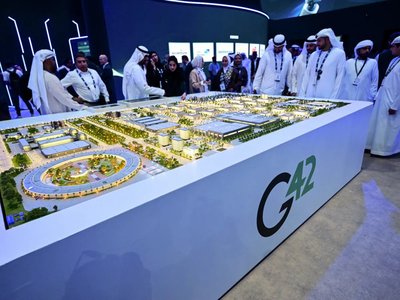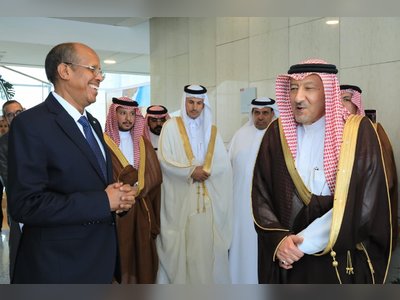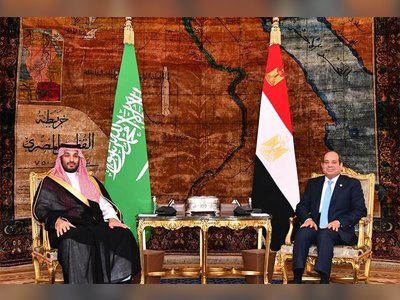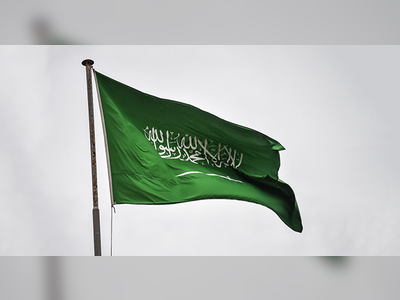
African diplomats can’t open bank accounts in Brussels — and Qatar scandal could make things tougher
Dirty finance, corruption and money laundering are at the heart of the Qatari influence scandal that's shaking Brussels to its core.
But according to African and Caribbean officials stationed in the EU capital, Belgium's overzealous application of financial rules designed to stamp out this kind of criminality has left diplomats from some 15 to 20 countries unable to open bank accounts that they need to perform their basic diplomatic roles.
The Organisation of African, Caribbean and Pacific States (OACPS) spoke out in June, stressing that the closure of bank accounts "causes enormous difficulties that affect the proper functioning of the diplomatic missions concerned" and warning that the freezing of their accounts is causing them "reputational damage."
The OACPS has demanded responses from banks, the Belgian government and the European External Action Service since 2021 but struggled with buck-passing between the institutions, third-country diplomats and Belgian officials told POLITICO. Embassies of countries including Cameroon, Mozambique, Djibouti, Trinidad and Tobago, Ghana, Kenya, the Central African Republic and Cabo Verde have been affected, according to a partial list seen by POLITICO.
The crux of the matter is a 2015 EU directive against money laundering and financing terrorism that Belgium has passed into law.
The stringent rules force banks to know why an account is being opened, who it's for and what type of transactions take place. Under these tougher requirements, banks are expected to act as a net to catch dodgy transactions. Banks also have to take more mitigating measures if money laundering risks are higher, for example with politically prominent persons — like an MEP — or if an account is linked to certain countries or regions in the world.
This means banks have to gather more data and check more information before taking up a client like an embassy or a diplomat, said Febelfin, an organization that represents Belgium’s financial sector.
The OACPS added that its members are committed "at the highest political level to combat illicit financing flows" and added that it is Belgium’s obligation to ensure the smooth functioning of diplomatic missions in Brussels. The group has established a working party to deal with the issue, which is being led by Cameroon.
"These embassies are paralyzed, they can't function normally," said Daniel Evina Abe’e, Cameroon's ambassador to the EU and Belgium. "It's difficult to function, to pay the personnel, you have to pay the suppliers, you have to pay the phones — if you don't have money, it's a way to ask you to close altogether."
It's not just OACPS nations that are affected, Abe'e said: Peru has had similar problems with its diplomats in Belgium, he said.
POLITICO contacted the four major Belgian banks, which stressed they apply a case-by-case analysis for diplomats and embassies.
ING, for example, "does not have a policy of systematically refusing institutions such as embassies as customers," according to a spokesperson, who pointed out that the strict regulation "in the case of embassies and diplomats requires great efforts."
The Belgian ministry of foreign affairs has been putting pressure on the financial sector to facilitate banking services for foreign diplomatic services. This led Febelfin to issue new guidelines on providing banking services to embassies. But these were non-binding, and the feeling diplomats and embassies got from the banks still seems to be: better safe than sorry.
Now, a new law is supposed to change that.
Qatargate
From early next year, banks will be required by law to provide basic banking services and thus provide relief for diplomats, but also for diamond traders and others who have struggled to get bank accounts.
If a diplomat is refused three times, they can appeal that decision and get designated a credit institution in Belgium to offer basic banking services. These banking services would at least make it possible to perform simple transactions, such as direct debits, transactions via payment instruments, cash deposits and transfers.
It would be possible to lodge such an appeal as of February, said a spokesperson for Belgian Economy Minister Pierre-Yves Dermagne.
The lack of banking services has become such a problem that a wide range of non-EU countries has pushed Belgium and the EU to find a fix, which is now in the works. But the cash-for-influence allegations against the Gulf state aren’t likely to make things easier for diplomats entering a Belgian bank.
The question remains how much more vigilant banks will be after prosecutors in Belgium seized €1.5 million in the investigation into alleged attempts by Qatar and Morocco to buy political influence at the heart of the EU.
"It will have an impact. That's for sure," said Abe'e, the ambassador for Cameroon. He added that some embassies have been forced to use cash, having been frozen out of their accounts.
For Febelfin, the scandal shows how "risk factors imposed by law are not merely theoretical,” said Isabelle Marchand, the group's director of European affairs. “Such cases show that the risks do not exist only on paper and that increased vigilance does have a goal and a function for society, i.e. the fight against money laundering.”
Febelfin declined to discuss individual cases in detail, but stressed that the European directive and Belgian law indicate there are risks of corruption and money laundering with bank accounts for a "politically prominent person" or a "politically exposed person," which does indeed require "increased vigilance."











